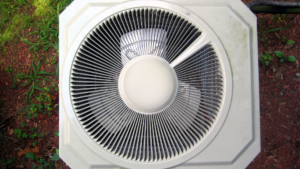
Signs Your Condenser Fan Motor Is Bad
Condenser fans are housed in the top of the condenser, one of the few parts of your AC system exposed to the elements. Essential for maintaining stable operation and optimal cooling, condenser fans are a critical but often overlooked part of your air conditioner. Besides not switching on when you activate the system, common symptoms of a bad condenser fan include:
Visible Damage
Because of their exposed location, condenser fans are more vulnerable to physical damage than any other part of your system. Falling debris can lead to chips, cracks, and dents in the grate or housing. Rust and corrosion are an even bigger concern, as they weaken the entire structure and can seriously compromise the fan motor. Bent, warped, or broken blades can impact the fan’s performance, leading to noise, vibrations, and inefficient cooling.
No Cold Air
Air conditioners manage temperature by circulating refrigerant between the evaporator, which absorbs heat, and the condenser, which dispels it. Once the condenser fan motor stops working, heat slowly builds inside the system, which limits the amount of cool air inside your home.
Higher Energy Bills
Circulating air through the condenser coils disperses heat as quickly as possible. When the condenser fan motor stops working, the rate of heat transfer drops considerably, preventing the refrigerant from reaching its optimal temperature before cycling through the evaporator. As a result, the system has to run continuously in order to maintain your desired temperature.
Strange Noises
Air conditioners are not meant to be noisy. Anything louder than a hum is generally a sign the condenser fan has begun to wear down and malfunction. A rattling, grinding, or buzzing sound indicates a more serious problem, such as loose screws, worn bearings, or a misaligned motor, which could create vibrations strong enough to impact the entire unit.
Frequent Shutdowns
Refrigerant not only absorbs and disperses heat from inside your home, but also heat generated by your compressor. When the fan breaks down, it increases the operating temperature of your internal components until eventually the system shuts down ‒ a safety feature designed to prevent your electrical circuits from burning out.
Tripped Circuit Breaker
In order to carry out normal functions, failing condenser motors often draw more current than they were designed to handle. Tripped circuits might also indicate that a capacitor has failed, requiring the motor to draw more power in order to start and run efficiently. Short circuits and ground faults can also cause power surges that overload the circuit.
Slow Spinning
Condenser fans are designed to rotate at a brisk pace. Any laborious movement is a sign of a faulty capacitor, worn motor, or debris within the fan housing, obstructing its movement.
Burnt Odors
A clear sign of a short circuit or ground fault, a burning smell indicates that the wiring inside your fan has developed a serious problem. For your safety, shut the unit down and call an HVAC technician to inspect it.
Fan Runs Intermittently
A failing motor, a faulty capacitor, loose wiring, or a malfunctioning control board can all cause fans to stop and start, seemingly at random, during operation.
Fan Runs When Unit is Off
Ball bearings reduce friction, ensuring your fan spins smoothly. However, as they wear down, they can create an imbalance that allows your fan to continue rotating even after it’s powered down.
Repairing or Replacing a Bad Fan Motor
In some cases, it’s more cost-effective to replace a fan motor than repair it. Before making your decision, consider:
- Age. Manufacturers build condenser fan motors to last 10-15 years. If your motor has been in operation for over a decade, it’s likely to experience more problems over the next few years, necessitating more repairs.
- Condition. With proper maintenance, fan motors can last for over a decade without any significant issues. However, if your motor has recently begun to experience an increasing number of operational difficulties, replacement may be the better option.
- Complexity. Simple problems are easy to repair, while complex ones are expensive. Weigh the cost of replacement parts against the cost of a new motor to determine which option is more efficient.
Unless you have experience working with HVAC equipment, it’s always best to consult a contractor before deciding how to proceed with a bad fan motor. They’ll advise you on the nature of the problem, the availability of parts, and the time required to carry out repairs.
Save Money on AC Repair with EnergyGuardTM
Repairing a fan motor can be costly, but Agway helps protect your home and finances. While home insurance only covers your heating, cooling, and electrical systems in cases of theft, accident, or disaster, our EnergyGuardTM Home Repair Program covers them from damage caused by wear and tear.
When the need for repair occurs, our customers don’t have to spend hours searching for a qualified repairman. They contact us instead. We maintain an extensive network of local contractors and send the first available one straight to your door. There are no service fees or deductibles either. We pay for the visit and all covered parts. Don’t let a malfunction upset your monthly budget. Sign up and start enjoying the benefits of EnergyGuardTM today!